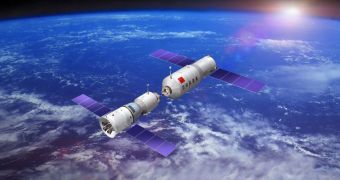China may launch its technology demonstrator spacecraft ahead of a planned launch data later this year. According to sources in Beijing, quoted by Space, the Tiangong 1 may launch by the end of August.
While it represents an essential part of China's commitment to having a space station operational by the early 2020s, this particular module is not a part of the actual orbital facility. Rather, its role is to demonstrate a variety of technologies needed for constructing such a structure in space.
One of its primary objectives is to conduct an orbital docking maneuver with the Shenzhou spacecraft next year. If that process is successful, then the country will have a clear path to begin constructing the actual space station.
Over the next two years, the Asian nation will have a busy schedule in space. Officials with the China National Space Administration (CNSA) plan to launch no less than three Tiangong capsules to the newly-created facility, of which two will be manned.
This will give CNSA the experience it needs in controlling the activities of an orbital crew, and will prepare it for the construction of the large space station it plans. According to China space watcher Gregory Kulacki, the Tiangong capsules are too small to be used as modules.
The expert, a senior analyst and China Project manager at the Union of Concerned Scientists (UCS), says that each of these spacecraft weigh about 8 tons, a far cry from the 22-ton module that created the core of the Russian Mir Space Station or the 80-ton core of the American Skylab.
Chinese officials announced some time ago that their entire space station will weigh only 70 tons. However, if everything goes according to plan, CNSA will commission the construction of an even larger space structure in the coming decades.
In an interesting twist, the Chinese plan to commission their orbital lab at the same time an international collaboration plans to deorbit the International Space Station (ISS), Space reports.
“Coincidentally, that is about the time that the ISS is scheduled to be decommissioned. If both those things happen, China's space station will become the de facto new international space station,” Kulacki says in a recent post on the Web.
Experts say that the Chinese push to colonize low-Earth orbit is part of the larger drive the nation exhibits of becoming a dominant global power, not just a regional one.
“Some members of Congress may try to use China’s progress in human space flight as an excuse to criticize the Obama administration’s space policy. Some U.S. defense analysts are likely to claim the orbiting space lab has a military purpose,” Kulacki explains.

 14 DAY TRIAL //
14 DAY TRIAL //